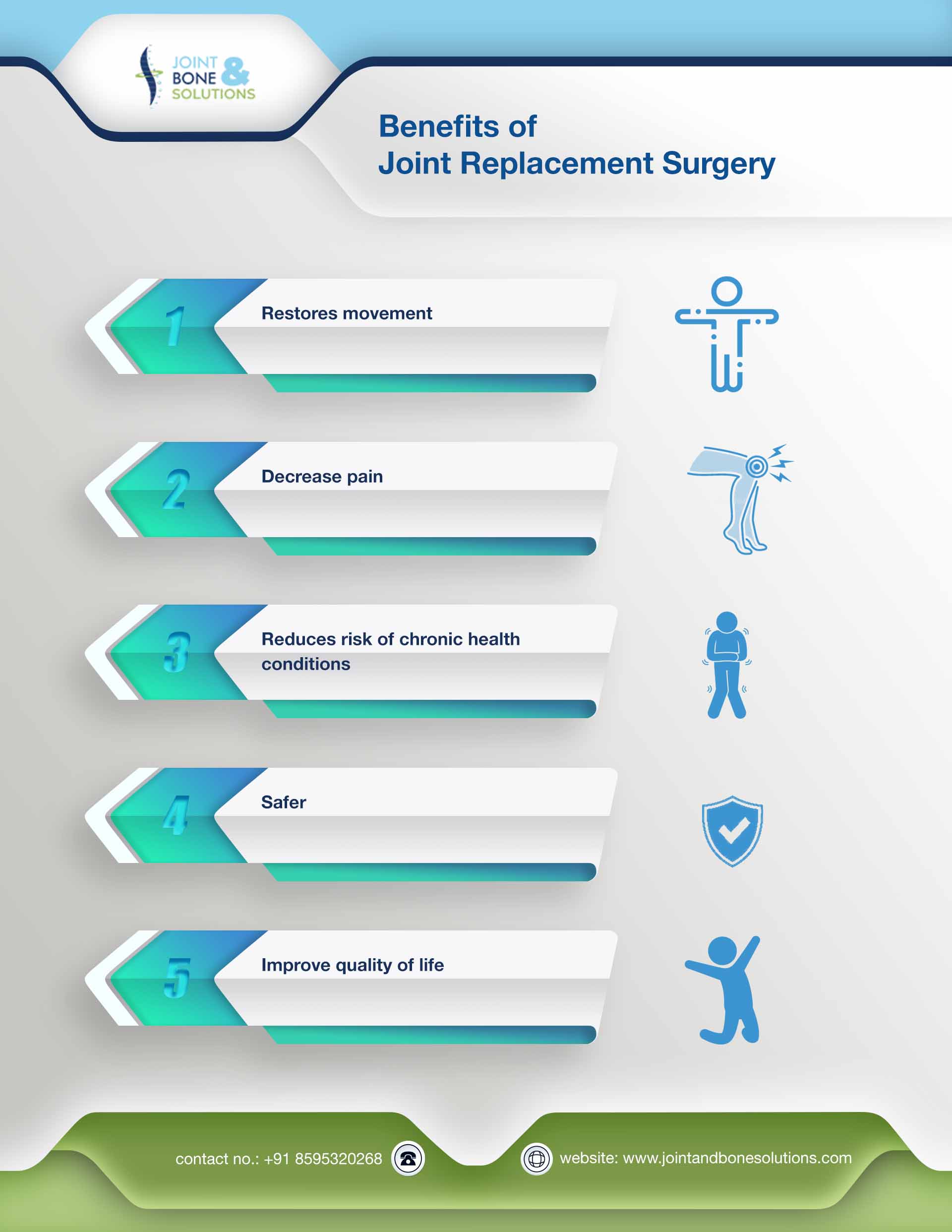How Can Joint Replacement Surgery Make Your Life Easier?

Joint Replacement Surgery for patients diagnosed with knee joint illnesses has come a long way now. In the past, it took several weeks and even months for patients to walk after extensive surgery, but not anymore. Today, thousands of patients worldwide are opting for joint replacement surgery to restore mobility and normal function while relieving pain.
This information will help you find answers to common questions like what is joint replacement surgery ,its benefits, recovery time and any associated risks.
Table Of Contents
Feel free to skip ahead if one topic catches your eye:
- What is Joint Replacement Surgery?
- When is it Recommended?
- How to prepare for joint replacement surgery?
- Procedure
- Living with joint replacement
- Risk and Complications
1. What is Joint Replacement Surgery?
Joint replacement surgery is routinely recommended for patients diagnosed with advanced end-stage arthritis and have already tried non-surgical treatment, but still experience disabling pain and functional decline.
Generally, this procedure is performed for the knee, hip, and shoulders, but it can also be performed on the ankles, elbows, and fingers.
What causes joint problems?
Joint problems are generally caused by osteoarthritis and rheumatoid arthritis. While the exact causes for arthritis remain unclear, following conditions can contribute to the damage of the joints:
- Old age
- obesity
- Trauma to the joint
- Hereditary conditions
- Minor repetitive injuries
- Problems with the cartilage or joints
Joint complications can also result from health conditions such as gout, fibromyalgia, bursitis, joint/bone infection, osteoporosis, and certain infectious diseases.
Benefits Of Joint Replacement Surgery
- Restores activity and movement: Joint Replacement Surgery allows patients to resume their hobbies and other activities such as hiking, swimming, biking, gardening, painting, and golf. It results in an overall improvement in the quality of life.
- Less pain: The primary reason why patients opt for Joint Replacement Surgery is to no longer suffer from excruciating and chronic pain.
- Reduces risk of chronic health complications: Joint Replacement Surgery is also indirectly associated with reduced chances of ailments like depression, heart failure, mortality, and diabetes rates.
- Safer and effective: Joint Replacement Surgery is both effective and safer than it was years ago.
Now that we have read about what is joint replacement surgery, let us now move our focus to when is the joint replacement surgery recommended.
2. When is it Recommended?
Joint replacement surgery is routinely recommended:
- If there is considerable and consistent pain in the joints
- When stiff joints restrict movement
- If the quality of life is decreased in any way
- If physiotherapy and medications are not helpful
Types of Joint Replacements
- Total hip replacement
- Total knee replacement
- Reverse Total Shoulder Replacement
- Wrist Joint Replacement
- Total Elbow Replacement
- Shoulder Joint Replacement
- Unicompartmental Knee Replacement
Access the innumerable advantages of joint replacement surgery at an affordable joint replacement surgery cost now.
3. How to prepare for joint replacement surgery?
In the weeks ahead of the joint replacement surgery, the surgeon and his/her team will prepare the patient for the upcoming procedure. For instance, the doctor may check the medical history and general health of the patient and recommend tests like radio imaging tests and blood tests to plan for the joint replacement surgery.
The team of medical professionals will guide the patients with tips and precautions to observe before, during, and after the surgery. This may include certain diet and lifestyle tips and making arrangements for assistive items like handrails, shower bench, or a long-handled reacher.
4. Procedure
The procedure requires admission in a hospital after the patient has been found fit for surgery by prior investigations.
During surgery the damaged bone ends and cartilage are removed and replaced with prosthetic components that are made of ceramic, plastic, or metal. The prosthesis mimics the movement and shape of a natural joint.
After the procedure is done, the incisions are closed with the help of sutures and the patient is kept in the hospital for post op rehabilitation.

5. Living with joint replacement
Typically, patients who have had Joint Replacement Surgery return to daily activities and function well within 7-10 days. The speed and outcome of recovery following a Joint Replacement Surgery primarily depend on the overall general health of the patient, the activity level before surgery and the type of surgery performed. For instance recovery after a unicondylar or partial knee replacement surgery compared to total knee replacement is much faster. A committed rehabilitation program and physical therapy are critical to a successful recovery after the surgery.
More than 95 percent of patients who have opted for a Joint Replacement Surgery have a successful outcome. Patients can expect to become stronger and more mobile over two to three months.
6. Risk and Complications
In rare cases, patients who have opted for Joint Replacement Surgery may experience side effects such as mild pain, nausea, fever, or stiffness of the joints. However, these side effects are temporary and generally subside on their own. In other cases, the team of medical professionals may provide anti-inflammatory drugs, pain-relieving medications, and medications to alleviate pain and discomfort.
At Joint And Bone Solutions, you will get the right suggestion and treatment with minimum risk of side effects.
Takeaway
Our team of medical professionals and orthopedic surgeons at Joint And Bone Solutions provides a customized, fully integrated patient experience for those requiring a Total Joint Replacement Surgery.
If joint pain impacts your lifestyle, you should consult top orthopedic surgeons at Joint And Bone Solutions for an in-depth evaluation and personalized treatment. The team of experts will help you access the best treatment at an affordable joint replacement surgery cost and avoid joint replacement surgery risks.
Our Best Bone Specialist & Best Joint Specialist Doctors in Gurgaon

Dr. Prince Gupta
MBBS, M.S (Ortho),
MCh Orthopaedics – USAIM
Contact No :
+91-9999965564
Email:
dr.princegupta@gmail.com

Dr. Anubhav Gulati
MBBS, MS Ortho
MRCS(1), Edinburgh
Contact No :
+91-8826612719
Email:
dranubhavgulati@gmail.com
Columbia Asia Hospital, Ansal Plaza Near Gol Chakkar, Block F, Palam Vihar, Gurugram, Haryana 122017
10 AM - 4 PM
Monday to Saturday
Sunday Closed
